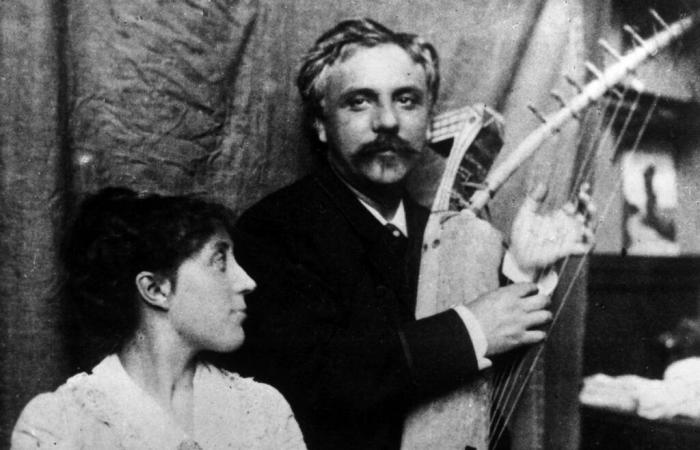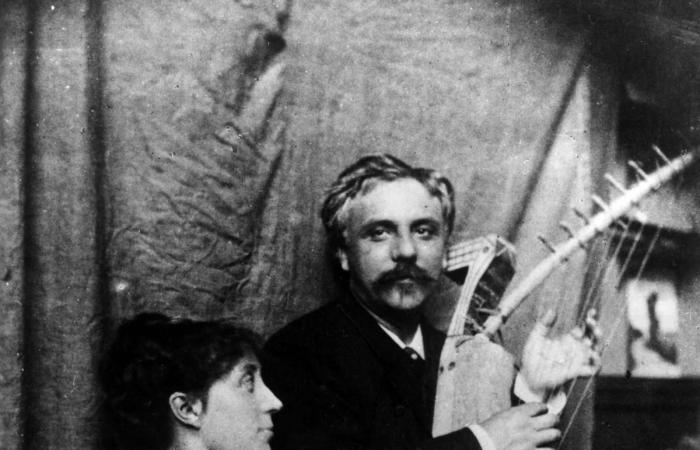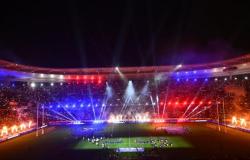A century ago today the great composer died. Between romanticism and modernity, Gabriel Fauré played tones with science. Less radical than Ravel or Debussy, he created a work much more daring than one might think. Demonstration.
Gabriel and Marie Fauré, in Prunay, in 1889. The musician is holding a ngombi, a Guinean instrument. Photo Doppio/Bridgeman Images
By Sophie Bourdais
Published on November 3, 2024 at 5:51 p.m.
Ps we celebrate in 2024 the hundredth anniversary of the death of Gabriel Fauré (1845-1924), let’s take the opportunity to dispel a misunderstanding. Afflicted by a distorting deafness which poisoned his last years, Fauré retained sharper ears than those busy music lovers who, through laziness or lack of curiosity, still summarize him as a gentle church and lounge musician, a past master in art of rocking the living and the dead with its elegant Pavane, your melody. After a dream or his Requiem without Last Judgment.
This image from Epinal has some truth. Educated at the Niedermeyer School, specializing in religious music, and not at the Conservatoire, obsessed with lyrical art, Fauré began his career as an organist and choirmaster. He frequented the elite of the musical world thanks to his master and friend Camille Saint-Saëns (1835-1921), only composed one opera (Penelope, created in 1913), shunned symphonic music, and duly founded a bourgeois home with the daughter of the sculptor Emmanuel Frémiet, Marie, who gave him two tenderly cherished sons. But reading his correspondence (1) reveals that the native of Pamiers (Ariège) has many other facets. Sent alone to Paris at the age of nine, he always asserted himself as a fiercely independent creator. A harmony adventurer playing with tonality like a cat with a mouse.
Also read:
France Musique: a week to the rhythm of Gabriel Fauré, this great modern romantic
A reformist conservatory director and an enlightened pedagogue, encouraging his students (Maurice Ravel, Georges Enesco, Nadia Boulanger, etc.) to get rid of academicism to find their own path. A concerned citizen, aware of (inter)national news. An epicurean fond of good food, culture, amateur photography and cigarettes. A fickle husband, accumulating conquests until his love at first sight, in 1901, for the young pianist Marguerite Hasselmans, his “beloved bird”, who joins him every summer in the lakeside retreats where he retires to compose. And will be, explains the pianist Aline Piboule, “his last link with his audience: when he stops going to listen to the performances of his works because, due to his deafness, nothing sounds as he wrote it, Marguerite will go for him and report to him what ‘she heard’.
Fauré seeks neither a slap nor surprise, he digs inside the soul.
Lucas Debargue, pianist
This ambivalent profile did not prevent him from being embalmed during his lifetime. “I received congratulations on my Trouble which was believed to be one of my newest works. But it was performed for the first time thirty-seven years ago! And it’s about this Trouble that a critic wrote that I imitated Debussy in a sensitive way. Debussy, in 1881, was 18 years old! I don’t think he was already imitable at that age! “, the composer lamented in March 1922, in a letter to his wife (1). Isolated incident, but significant: less openly radical than Ravel or Debussy, Fauré will remain for a long time in the shadow of his contemporaries, and we will have to wait for the analysis of admirers such as the philosopher Vladimir Jankélévitch (1903-1985 ) to restore its avant-garde part and its importance in the evolution of French music.
“History chooses markers: for Fauré, it retained church music and melody”, confirms Alexandre Dratwicki, artistic director of Palazzetto Bru Zane. “Outside our borders, it is little played. With a whole section of forgotten catalog, notably the mature works. » Because too demanding? They require, in fact, patience and tenacity. Young singer, Stéphane Degout first thought of not doing “just a mouthful” of The Chimerical Horizon, ultimate cycle of melodies with apparent simplicity. Before hitting a wall: “In Fauré’s first period, there is a real vocal line, an immediate pleasure in singing. After 1906, everything became more refined, landmarks became rarer, everything that allowed one to be comfortable disappeared. We only have notes that roughly correspond to what the text would be like if we recited it. We also see this in Debussy, but Fauré had not accustomed me to it, and I did not have, then, the necessary background to achieve it. »
His music is so awesome!
Pascal Quignard, writer
The baritone returned later. This year he delivers a superb album of the latest cycles with his accomplice Alain Planès, and helps his students “ to agree to stumble, to rehash, and above all not to add effects when they are lost in Fauré, because this music does not support them”. Beyond melodies, a whole range of playing skills has developed since the beginning of the 21st century.e century around Fauré. His chamber music is now perfectly executed, with the required passion and without the effect “lampshade” that the composer feared; we will hear it in five concerts, in addition to the Requiem, during the next Rencontres Musicales d’Évian, and Alpha Classics has just reissued the captivating complete with piano conducted by Éric Le Sage between 2010 and 2012 (6 Alpha Classics CDs). THE « choc » of the discovery of Nine Preludes aroused, in 2020, in the pianist Lucas Debargue, a craving for deciphering, then the obsession, brilliantly satisfied, of recording a complete work for piano alone – while he was, he confides, “passed by Fauré as a teenager” . The year devoted to navigating the harmonic mazes of these skillfully crafted pieces, where fire smolders beneath the ashes, has shocked the man as much as the performer: “Fauré seeks neither a slap nor surprise, he digs inside the soul. I perceive deeply philosophical elements in his music. »
Discover the rating and review
Complete for solo piano: the beautiful walk in Fauré by Lucas Debargue
Fascinated by the journey of this composer spanning two centuries, “from the arch-romantic and belcantist side of the first works to the harmonic complexity and polyphony of the last”, the pianist Aline Piboule wanted to pay homage to him by offering possibly non-music-loving audiences a “project oneself into the life and music of Fauré”, one illuminating the other through a recital-show designed with the writer Pascal Quignard. She is also preparing to release an album this summer entirely dedicated to Fauré. And ignites: “His music is so awesome! We could see something intellectual in it, perhaps because he directed the Conservatoire, and this had consequences on the interpretation; that doesn’t stop her, for me, from being passionate, carnal, hypersensual! » A good listener…
Fauré’s Last Love, by Aline Piboule and Pascal Quignard, November 9 at the Würth Museum.
Tribute to Gabriel Fauré, from November 3 to 7, on France Musique.
Article originally published in June 2024.







